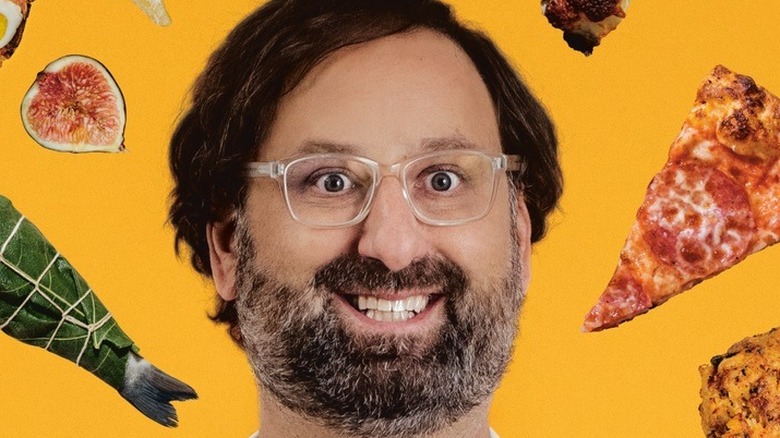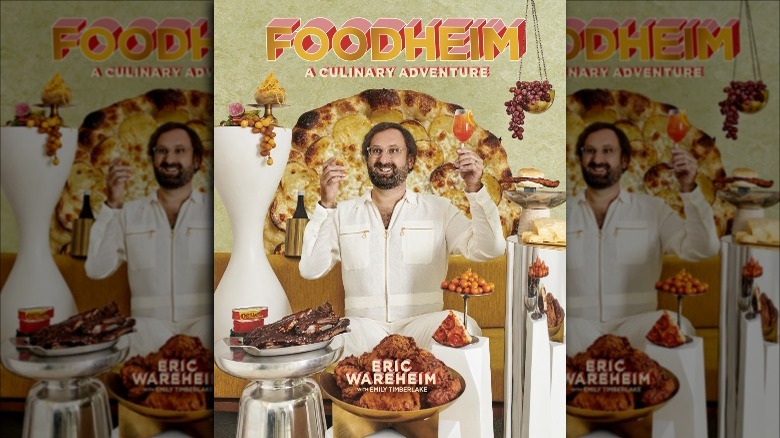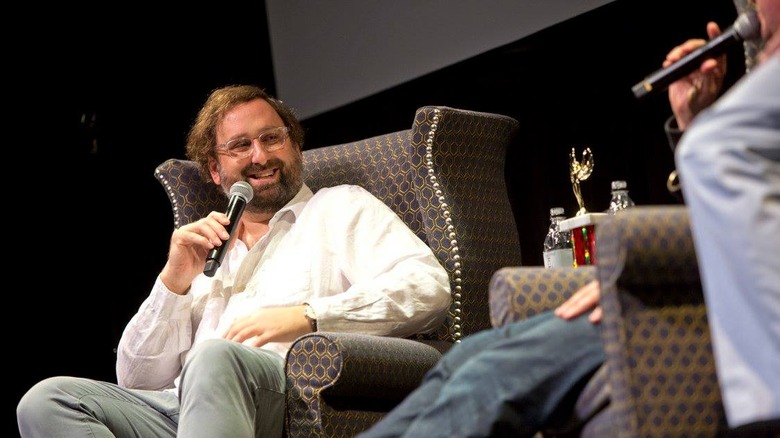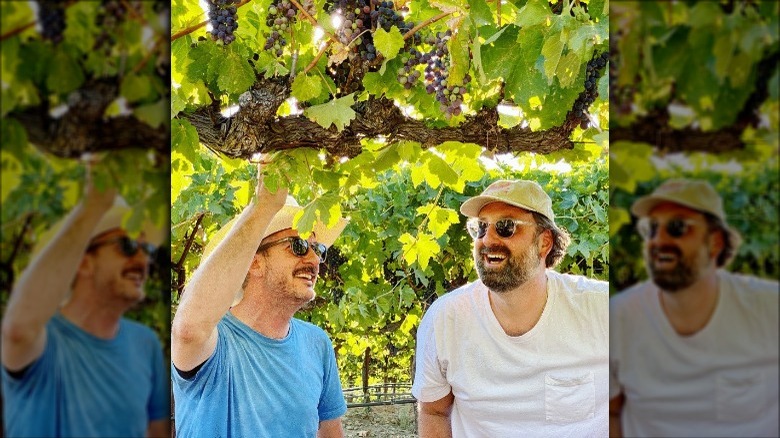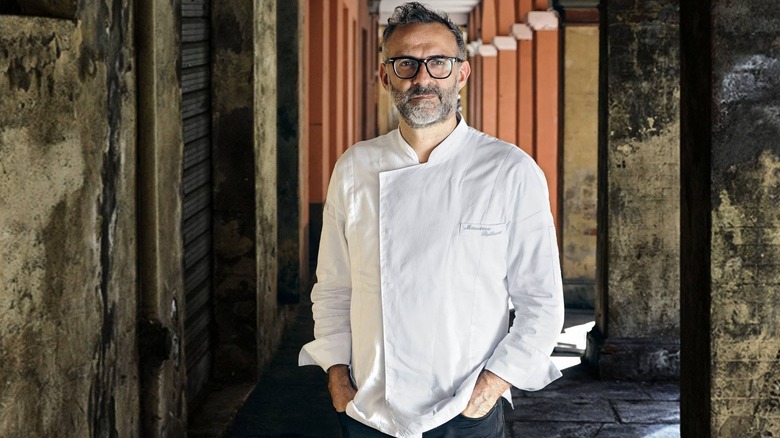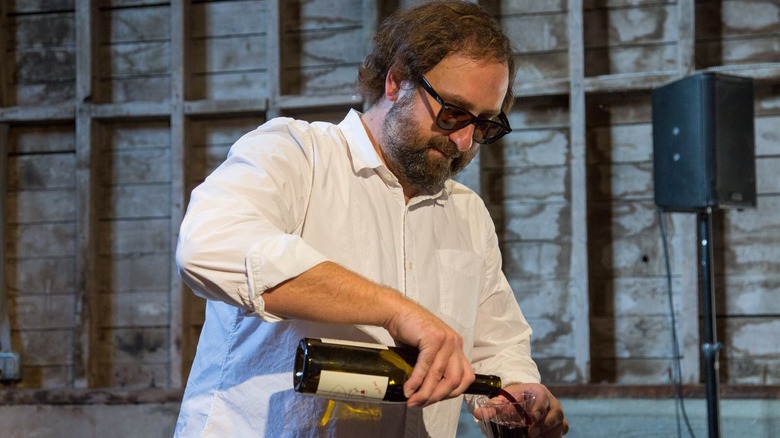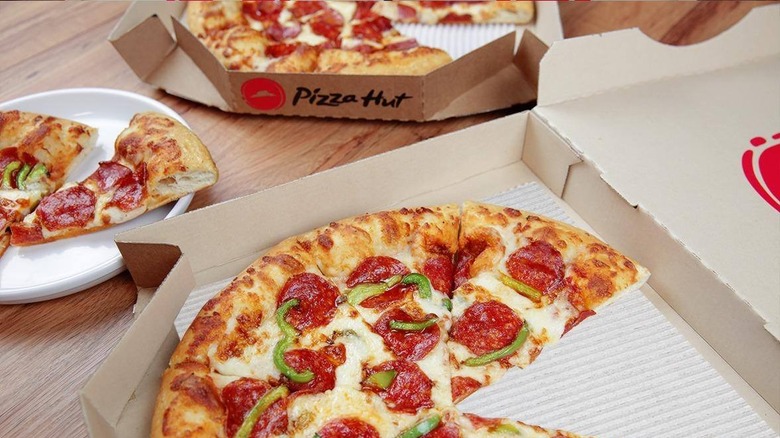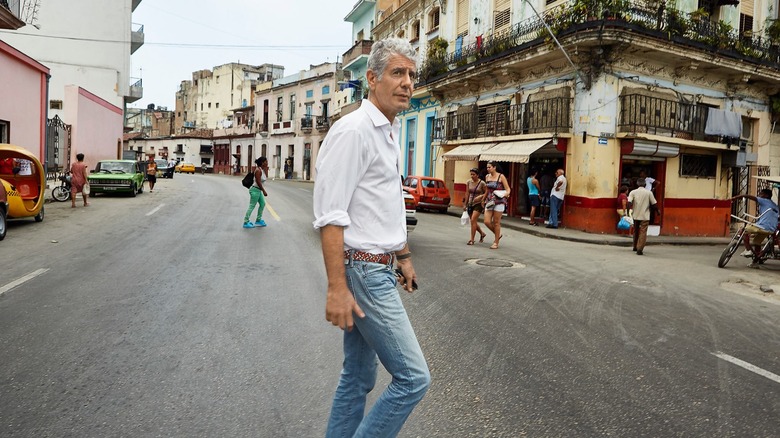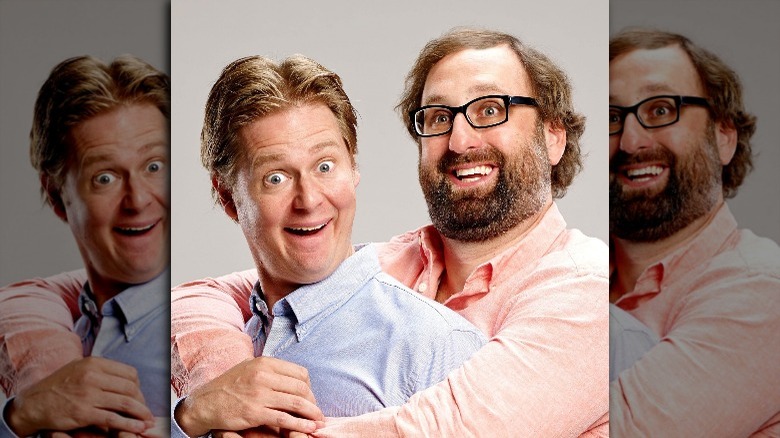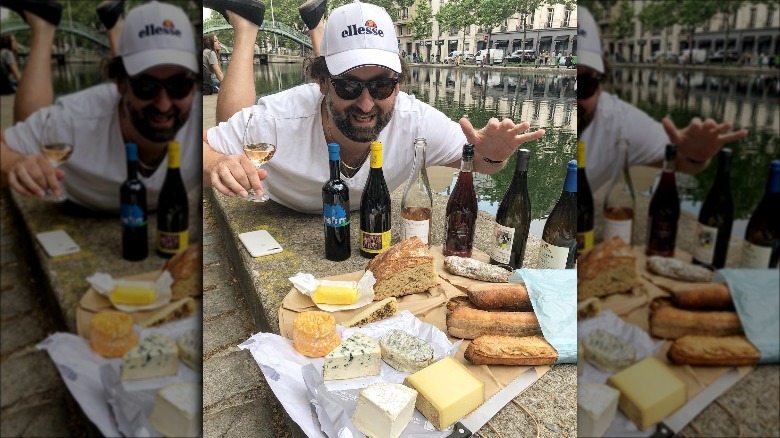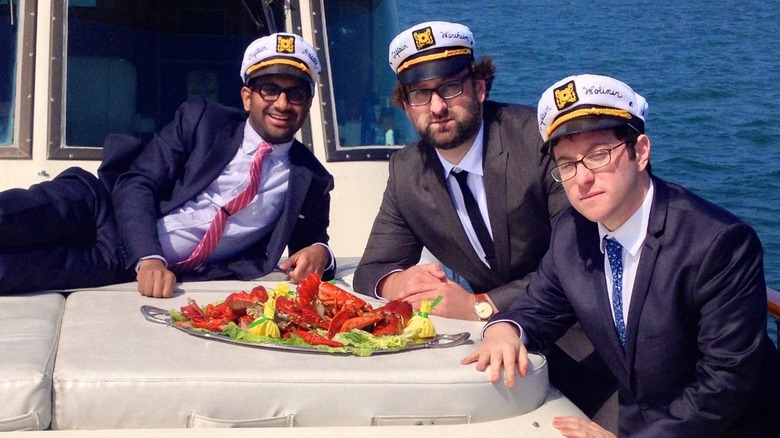Eric Wareheim Dishes On Foodheim And How He Got Into Food - Exclusive Interview
You'd be forgiven for assuming Eric Wareheim's conversion to devoted gastronome is just another spoof and a goof. The supremely talented actor, writer, and director, along with longtime partner in comedy Tim Heidecker, has a penchant for skewering the ills of pop culture with an hilarious and occasionally terrifying combination of satire and absurdity. The Adult Swim icons are notorious for bringing a monkish level of commitment to their send-ups, whether it's hitting the promotional circuit for "Shrek the Third" despite having zero association with the film or putting their distinctive mark on boilerplate network sitcoms with the unnerving multi-cam series "Beef House."
But unless Wareheim, who has spent the last several years documenting his globe-trotting dining and cooking adventures on social media, is channeling some next level Andy Kaufman subversiveness, his just-released expansive culinary love letter "Foodheim" makes clear that his passion for food is no joke. With a wide-ranging mix of recipes from Ensenada-style shrimp tacos to spicy Sichuan rib "ticklers," party-planning tips, wine pairing advice (Wareheim is the co-winemaker for the well-regarded Las Jaras Wines), and, of course, Wareheim's distinctive comedic sensibilities (expect plenty of clip art, a secret language, and a chapter devoted to small horses), the book is a refreshing detour from the staid culinary compendiums of its ilk.
In an exclusive interview with Mashed, Wareheim discussed the people and places that inspired "Foodheim" and reflected on his food evolution from the traditional German meals of his youth to his current tireless pursuit of crafting the perfect pizza.
Eric Wareheim explains why he wrote Foodheim
"Foodheim" has a certain yin and yang, for example, you open by professing your love for Poison's C.C. DeVille, and then you end the book with a recommendation to pair shrimp cocktail with a Muscadet. Was it difficult balancing your irreverence while dropping some serious food knowledge?
Yeah. I'm glad that you picked that up because that was my most important kind of theme I wanted to hit. Because I started in the comedian funny world, and then I moved to wine — that was hard enough to tell people I'm actually serious about wine. And then with the book, I want to do the same. There's some amazing recipes in here, but also, food is really fun. And we can talk about burgers, and we can talk about wine. And we can make it silly at times, but there are times to give it real respect. So I just love bouncing back and forth.
A lot of food shows and food books are off-putting because they're too serious. And I wanted it to be sort of approachable and fun for people that are just getting into it, or people that are like medium-level home cooks.
"Foodheim" is, at its core, extremely practical. You list pantry essentials, offer cooking tips and tricks, the recipes are accessible. Who is your intended audience and what do you hope readers take away from the book?
I think my intended audience is sort of me 10 years ago, when I first started cooking. I wish I had this book that is not just a theme book. It's really, how do I make a perfect steak? How do I do fried chicken? How do I do schnitzel? All these things. How do I make a good salad? How do I pick a certain kind of wine? It's sort of like everything that matters to me. And I think it's a well-rounded thing, as well as I want readers to also feel the nostalgia of the book. I took a lot from my childhood. And as I get older, I think that's such an important thing is to kind of honor what you had growing up, even if it was crappy.
My parents had no money, but my mom would cook recipes from her village, because that's what she knew. And I wanted to keep that going, by putting those specific recipes in this book, so people can sort of like feel what that feels like, to be like, oh, that's where my family's from, or that's a history of this kind of pasta or something like that. It was sort of both. One is yes, technically really accurate, easy cooking thing for all your favorite foods, but two, a little bit of the story and the power of family and food that I wanted to pass on.
How Eric Wareheim's grandparents inspired his comedy and love of food
In terms of family, you talk a lot about your maternal grandmother, your Oma. Can you talk about how she inspired your cooking? And was she funny? Did she inspire your comedy in any way?
Yeah. I mean, it's interesting. My Oma and Opa [grandfather] I think are the ones, the funny ones, in the family. They lived in Germany. They would constantly do funny things because we couldn't communicate to them because we didn't speak German because we were a**hole American kids that didn't ... I really regret not having my mom speaking more German to me and learning it. But anyway, so they would communicate. They would take a corn husk and do a mustache and just dance around, super simple stuff that I love. So I really bonded with them. But what I really remember is going there as an American, being like, I need soda, I need burgers. I need really intense sauces for everything, A.1. Sauce. And they just couldn't believe it. They were blown away. Like little simple things, like I would want "orange soda," but they would have orange juice. And then they would add sparkling water. Just a little bit of flavor, just to stretch it.
My sister and I were just doing huge pints of just orange. And they kind of are like, "Just chill. Try this. And don't put salt on this until you taste it." They had a garden. So all of those things as a kid, I was like, I hate this. I want chocolate. But I think as you get older, you're like, oh my God, that actually is how I cook right now. They were doing that, and they put that little bug in my head.
You include a lot of family recipes in the book. Is there a recipe that has particular meaning for you?
Yeah. I would say the beef rouladen. It's like a meat roll with an egg inside and brown sauce. And it's just like what you would eat on a Saturday or Sunday or a special occasion. My mom still makes it every time I come home, whether it's for the holidays or my birthday. It just symbolizes this like deep, warm hug of a dish. Plus, it's interesting. Not a lot of people have seen it. So it was cool to put something that I ate all the time in this book, so everyone can try it. It's not hard.
Why food is more than just a hobby for Eric Wareheim
With Las Jaras, and "Foodheim," and your general food exploration documented on social media, this is obviously something that you're extremely passionate about. Can you pinpoint a moment in your food history where you realized this would be more than just a hobby?
Yeah. I think it was when I first started making wine. At first, it was a hobby. I was just a food freak. I would travel around the world with my friends, drink wine, but it wasn't till I met [Las Jaras winemaker] Joel Burt and we started a wine company and we're like, "Oh, s**t, we can do this." I guess that was the first time I thought, "Okay, this is an actual part of my career."
And then with the book, I was like, "Oh, and I'm hosting food events and wine events." It's like a big part of my career now. And I'm also writing a TV show about a really gross rich wine family. So I'm like, wow, this really intersected the writing and directing part of my life too, in like a cool way. I love it. It's just a fun thing because I still love doing comedy. I still like working with Aziz [Ansari] and Tim [Heidecker] and all that stuff. But [at the] end of the day, we all got to eat. And that's a powerful thing. And to bring it into your other day-to-day stuff is pretty cool.
Since your comedy is often expressed with a wink and a nod, have you had difficulty convincing people that this is authentic and food is truly a passion of yours?
Yes. I mean, a lot of difficulty was ... With the wine stuff, it's like, no one wants another celebrity wine. A lot of people put their names on it, but I'm such a D-list celebrity anyways. But my comedy was ... We would make fun of food and wine a lot, the kind of elitism of it. So our fans were like, "What are you doing? Is this piss? Is this a joke?"
And so, it took a lot of training. When I took to my Instagram, I was like, I'm just making it a food blog, just to show you that I'm very serious about food and wine. And so, with the book, the same thing. Some people are very excited that they get it. Other people are excited to see what it will be, because they don't look at me as one thing. But my whole attitude is you can have many ... I used to be a wedding photographer, so you can really switch gears whenever you want, if you have enough passion and drive.
The massive celebrity chef who wrote a blurb for Foodheim
There are plenty of other celebrities who are entering the culinary fold and for many of them, their motivation seems to be just to cash in on the food craze. Do you take issue with that?
Yeah. I mean, I'm always really careful. It's just my personality with comedy. I'm like, oh, I hope everyone likes it. But at the core of what I do in comedy is it's so personal. And it's just like, we just do what we can do and that's it. We can't fake it. And that's what I'm doing with food and wine. It's like, this is my soul. This is what I do when I'm not on camera. I'm kind of opening my life up here and showing people how to cook. And I think it's very similar to comedy.
Making someone a beautiful dish, it's like one of the best gifts to see them enjoy it. The same as making someone laugh. It's like this real cool emotional exchange. So that's what I feel I have to give. And if I can make some people laugh and learn how to make pizza along the way, I think that's a real fun, new challenge in my life.
One guy who's taking you seriously is Massimo Bottura, who wrote a blurb for your book, which is amazing.
I know. It's crazy.
He wrote, "Eric can cook, and this book shows us how much he loves it." What is your relationship like with Massimo and how did you feel when you first read his words?
I know him from shooting in Italy. We shot the second season of "Master of None," and we shot a restaurant scene. And Aziz and I were just having a coffee somewhere, and he runs in and is like, "Hey, I know you guys are shooting in my town. Why aren't you shooting in my restaurant?" And we're like, "You're literally the number one restaurant in the world. We didn't even want to ask you." He's like, "No, you're filming tomorrow. We're doing it in the private room. You're getting the full experience, all the wine, blah, blah, blah." We were like, "Holy s**t." So we wrote this whole scene for us to go there. And it was just mind-blowing. It was like one of the coolest experiences, because we were living in Italy and making pasta, but he kind of showed us his way of doing it.
And then we just stayed friends. And I write a lot about Italy and pasta, so I asked him to do a blurb. And he did. And I was like, wow. And what he wrote about me so warmed my heart. He really got it, so I was so thankful.
Have you had the opportunity to cook for him?
Not yet. No, it's only been the other way. He's cooked at events in New York that I've been to. And he has a restaurant in Beverly Hills now, that I want to try, but I haven't gotten a chance yet.
Don't expect small horses at an Eric Wareheim wine event
You mentioned in the book the intersection between chefs and comedians. Who's the funniest chef that you've come across?
That's a good question. Well, this one guy, Chris Kronner, who's a burger guy, he helped develop a few recipes. He's really funny. He was a reason there's a small horse chapter in the book, because we always pretended that we would have small horses come to our events. We would do wine and burger events. And on the flyers, it would be like, "Come pet small horses," as a joke. But people would show up and be like, "Where's the small horses?" So I was like, "No, there's no small horses."
But he's pretty funny. But most chefs do have a really good sense of humor. They're just freaks. They work all night. They're like comedians in a way. We both have this same kind of "f**k it" attitude. Let's make something special no matter what.
When did cooking really enter the picture for you?
I would say right when I started working on "Master of None," we got a lot of training from real Italian nonnas about how to make pasta. I started hanging out with a lot of pizza chefs and just kind of training and learning. I took pizza lessons. And whenever I would travel, like I went to Thailand, I took cooking lessons. And I started learning from my mom.
It all happened maybe 10 years ago, this sort of real fever for, "Oh my God, I can do this myself." And once you make something at home just once, and it's amazing, I got the bug to just do it over and over and over again. It became just a hobby, and then it became a little bit more ... I thought about it a little bit more professional. A lot of my friends said it tasted good. So let's go.
You're hosting dinner parties. You're cooking for professional chefs. Are you nervous about their reaction or have you built up enough confidence at this point when it comes to sharing your food with other people?
Yeah, I think that there's always a nervousness, of course. But I think with comedy, it trains you to not be nervous. You know what I mean? I've gone on tour, I've performed in front of 5,000 people, and you just kind of learn that skill to just go for it. And even with cooking, I mean, of course, I practice and do test runs if I'm ever doing anything important. But I think it's more of a confidence thing. It's like, "here it is!" It's almost more of a performance of like, "this is cool that you're doing this." And you give people a little room, if it's not perfect, if it's not like a restaurant scene. So I just kind of go into it with super confidence.
Why Eric Wareheim is a Pizza Hut guy
Do you have a go-to dish?
I mean, right now I've been doing pizza a lot for friends. I kind of pretend like my pizza is the best in LA, so everyone wants to come over and try it. So I've sort of perfected a dough that's in the book. And then I do a pan pizza that kind of freaks people out because it tastes a lot like Pizza Hut in a way. It's a deep dish, so that's a fun thing. Yeah. It's fun to just prove [to] people that I can do it. I think that's part of the fun.
You discuss your childhood love of Pizza Hut. First of all, why not Domino's? And do you still indulge in fast food?
Yeah. I mean, Pizza Hut was ... It was only because we only had Pizza Huts in our town of Audubon, Pennsylvania. It was sort of before Domino's and Papa John's. I remember those popping off, but I think Pizza Hut was around a little bit before them. And it was just like where we went after our baseball game. That was why I have a particular love for it. I also think it's better in a way, because it's just so greasy and those breadsticks were really good.
But now, it's pretty hard for me to go to a fast food pizza place, just because in LA, there's so many good ones and New York there's so many good ones. So I just try not to go there. But I'll definitely do a Shake Shack burger every once in a while. All the fast food s**t is good now, too. It's crazy. In-N-Out out is not bad here and there, but I try to keep it to that, not to fall too much into the McDonald's worlds.
You've eaten your way through Italy, through Thailand, through Japan. Is there a spot that's on your bucket list where you are dying to go to?
Yes. Peru. I've never been to Peru. I have a Peruvian recipe, Leche de Tigre, in the book, like a ceviche with amazing sauce. And I hear that's just the culinary mecca right now because it has the influences from Asia and South America. It's supposed to be very special, and that's really where I want to go next.
Aside from your wife, do you have a favorite food traveling companion?
Yeah. I mean, with Aziz, I've traveled around a lot around the world and also Joe Beddia who is a pizza guy from Philly, and he and I have done Noma together. And next year we're going to Oktoberfest and visiting the German wine regions, which I've never done. So I'm really excited for that, to kind of go back to my roots and try some of that wine.
Eric Wareheim reflects on Anthony Bourdain
You wrote about "slamming" martinis with Anthony Bourdain in London. How did that meeting come about? And do you remember anything the two of you discussed that night?
Yeah, I just remember, [Tim Heidecker and I] were there, and we were such mega fans. And he didn't know who we are, so we had a mutual friend who went over to his table, and it was like him and his producers, and bought them around of drinks. And then Bourdain walked over to us. He was like, "Who the f**k are you guys?" And we're like, "We're Tim and Eric. We're comedians, but we're not like dorky comedians." It's like, all right, let's have a drink. And he ordered us martinis. And we just sat and shot the s**t. We were asking him more questions about like ... He just seemed to be in the zone, working. And then we became, like, internet friends for a couple of years. It was one of my highlights. And I would see him at events in New York a lot, food events, and we'd talk. And he's just kind of always a hero, still is.
Anthony Bourdain famously had disdain for the Food Network culture. Are you a Food Network fan? Do you have an opinion on Guy Fieri?
Yeah. I don't really know much. They asked me to be on "Guy's Grocery Games" once, which I really wanted to do, but just to kind of f**k with the format. Whenever I'm on a late-night show, it's usually like a comedy experiment. So I wanted to do that, but they kind of sniffed that I was trying to do something weird. And they're like, "All right, you can't do that. You got to be like normal." So it's like, I don't want to do it.
But I will definitely watch Guy's Diners Triple D, whatever that show's called, late at night in a hotel room. Just watching people eat grilled cheese is fun. But I actually am way more obsessed with kind of the new generation of food shows. And there's so much stuff out there right now that's fun, like "Chef's Table" and David Chang shows. I just re-watched "No Reservations" over and over again, sort of like I do "Curb Your Enthusiasm." It hits the same emotion for me.
What Tim Heidecker thinks of Eric Wareheim's food obsession
What have Tim Heidecker's thoughts been on your foray into the culinary world? Did he take it seriously at first?
We make fun of each other for every little hobby. I make fun of him for making music, and he makes fun of me for cooking. But at the core, we both love each other and respect that we're doing these new things. And I'm going to be on his podcast in a couple of weeks, promoting the book, and I'm going to have him on my ... I'm doing a little cooking series called "Heimy's House," where I cook a couple of dishes in my house, just to kind of show people I'm serious about the book and I can actually cook. He's going to come on and kind of f**k it up and make fun of it. So we still kind of retain that energy of busting each other's balls about it.
Does he have a favorite dish of yours?
Not really. I think I'm going to cook him smashburgers, because it's, I don't know, everyone loves burgers, and we have a lot of burger jokes in the Tim and Eric world. So I'm pretty sure I'm going to take something really simple and blow his mind with it. But he cooks too. He's a pretty good cook, so we'll see. I'm sure he'll cook out of the book. It'll be fun to see what he does.
Eric Wareheim reveals his all-time favorite meal
Beyond expanding your culinary horizons, how has your food explorations sort of changed you?
Well, I think it changed me very deeply when you can get access to the real deal, when you're going to have dinner at ... People's families is like the number one experience, but then having access to really insane restaurants. Recently, I was in San Sebastian, and we went to this restaurant Etxebarri which is really hard to go to. And it's just like going ... I view it as like going to a museum in a way, and it really shows the deep culture and history of a particular town and a particular chef and a particular style. It changed me a lot, by just respecting the food and where it comes from. And I think that's what I put in the book a lot. It's like, this is not just a flash in the pan thing. This is like a real deep immersion into why this [is] beautiful. Same with wine. It's like once you have gone to these places, realize that vineyards have been around for thousands of years, that monks used to farm this land. It's just cool. The older I get, the more that's important.
You're fortunate enough to live in Los Angeles, which is such an unbelievable food city. If you have friends coming in from out of town, what's your go-to food tour of LA for them?
My most recent food tour of LA is Holbox which is a Mexican seafood spot downtown. Bistro Na's, which is in the San Gabriel Valley. It's a Szechuan place. And if we're balling out, Sushi Zo downtown, which, we have so much sushi. Those are like my three that I feel like are very LA and very good.
You've eaten at some of the best restaurants around the world. Is there one meal that stands out in particular?
I mean, I would say my top two meals are sushi Sawada in Tokyo, which is a small six-person experience, three or four-hour dinner or lunch. And I literally cried after it. It was so cool. It was just like I was saying before, you're immersed in this ancient art of the style of omakase cooking that is so powerful. It just took over. That, and I would say Etxebarri. The first time I went to Etxebarri was so cool, because it was the form. It was that they just cook simple things over oak wood and that's it. And it's like a three Michelin star place, but it's so simple and powerful. It's pretty good.
The future of Foodheim
What's the best advice you've ever gotten from a chef?
I would say the best advice I got was from Chris Bianco, who's a pizza guy in Phoenix. And I cooked with him many times, or I watched him cook. He kind of sits down and holds court and just teaches you life lessons. And he was pretty much just like, "There's a lemon tree right here. Go pick that lemon. That's going to be the best thing in your food. Anything that you can go and touch that's right there." In Phoenix, he just sources all locally desert stuff, which makes his food really cool, all his grains and stuff. So I think that was it. It was like, get whatever's close enough to you that you know is good, that you know the person that made it, and then your food is just going to taste way better.
What's next for you in the food space? Are you going to go the Chrissy Teigen Cravings route and have pots and pans in Target or wherever?
No, we haven't thought that far in yet. But I want to make a food and wine show. I think that would be really funny, something like "Foodheim," but the televised version. And Las Jaras is starting a new line called the Waves wine, which is like canned wines and really cool, the best canned wines you can get. So we're just kind of moving up and seeing what's ... I don't want to do a restaurant. I just want to hopefully [write] Foodheim Two, and just continue having fun.
Do you have a specific idea for what you want to do in the TV space?
Yeah. I have a sort of, kind of a travel show, sort of my version of "No Reservations," but funny, taking my friends around. Like bringing John C. Reilly to Chicago, where he's from and eating deep-dish pizzas. And then I cook for him. "Foodheim" is a reflection of my life and food. I think the show would be a reflection of my friends and my traveling and just seeing what it's like to go to Italy and to make pasta, but making it not pretentious and making it more accessible and fun.
You can check out Eric Wareheim's favorite recipes, including that beef rouladen recipe, by picking up a copy of his new book "Foodheim."
